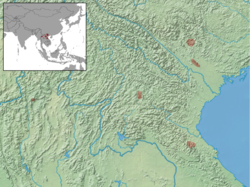| Collared sprite | |
|---|---|
| Scientific classification | |
| Kingdom: | Animalia |
| Phylum: | Chordata |
| Class: | Mammalia |
| Order: | Chiroptera |
| Family: | Vespertilionidae |
| Genus: | Thainycteris |
| Species: | T. aureocollaris |
| Binomial name | |
| Thainycteris aureocollaris Kock & Storch, 1996 | |
 | |
| Synonyms | |
Arielulus aureocollaris | |
The collared sprite or collared pipistrelle (Thainycteris aureocollaris) is a species of vesper bat found in Laos and Thailand. [1] [2]
